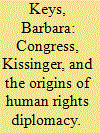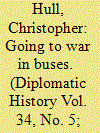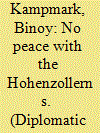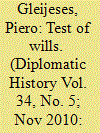|
|
|
Sort Order |
|
|
|
Items / Page
|
|
|
|
|
|
|
| Srl | Item |
| 1 |
ID:
099987


|
|
|
|
|
| Publication |
2010.
|
| Summary/Abstract |
The Congressional "human rights insurgency" of 1973-1977 centered on the holding of public hearings to shame countries engaging in human rights abuses and on legislation cutting off aid and trade to violators. Drawing on recently declassified documents, this article shows that the State Department's thoroughly intransigent response to Congressional human rights legislation, particularly Section 502B, was driven by Kissinger alone, against the advice of his closest advisers. Many State Department officials, usually from a mixture of pragmatism and conviction, argued for cooperation with Congress or for taking the initiative on human rights issues. Kissinger's adamant refusal to cooperate left Congress to implement a reactive, punitive, and unilateral approach that would set the human rights agenda long after the Ford administration left office.
|
|
|
|
|
|
|
|
|
|
|
|
|
|
|
|
| 2 |
ID:
099986


|
|
|
|
|
| Publication |
2010.
|
| Summary/Abstract |
The sale of buses by the Leyland Motor Company to Cuba proved contentious, not only in the realm of Anglo-American relations, but also in the domestic sphere of a behind the scenes inter-departmental disagreement within the British government. This is because the bus exports pitted political against economic interests at the height of the Cold War and in the midst of a British export drive. As Her Majesty's Government readily recognized, Washington was particularly sensitive over any issue related to Cuba, which by 1963 was firmly in the communist orbit of the Soviet bloc and which the United States was determined to isolate economically through the application of a trade blockade.
The decision to approve the sales came at the end of the Macmillan and Kennedy administrations, and clouded the short-lived partnership of Prime Minister Alec Douglas-Home and President Lyndon B. Johnson. The bus exports became an election issue in the campaigns of both leaders in 1964, assuming a political significance that belied the buses' seemingly innocuous function and outward appearance.
|
|
|
|
|
|
|
|
|
|
|
|
|
|
|
|
| 3 |
ID:
099985


|
|
|
|
|
| Publication |
2010.
|
| Summary/Abstract |
The notion that a nation's 'people' are the sovereign arbiters of its affairs, exercising power through a representative leadership who govern in the name of public 'virtue', point to a concept of political legitimacy which has proven to be a guiding principle in American diplomacy. The Wilson administration's response to peace overtures by the German government between 1917 and 1918 is a good illustration of this tendency. In line with American domestic political mores and values, the Wilson administration, along with the U.S. Congress and American publicists sought to encourage a political reshaping of Germany through aggressive public diplomacy. This was achieved by apportioning war responsibility between sections of German society (guilty autocrats and subservient citizens). The legitimacy of the German state as an equal partner in international relations, was thereby questioned. This distinction, in time, collapsed showing the inconsistencies within the Wilson administration in challenging the internal workings of a foreign government.
|
|
|
|
|
|
|
|
|
|
|
|
|
|
|
|
| 4 |
ID:
099988


|
|
|
|
|
| Publication |
2010.
|
| Summary/Abstract |
Until 1975, Washington paid little attention to southern Africa, a backwater in the Cold War where weak insurgencies posed little threat to white rule in Angola, Mozambique, Rhodesia, and Namibia. The collapse of the Portuguese dictatorship in April 1974 meant the end of white rule in Angola and Mozambique. The Cuban victory in Angola the following year propelled southern Africa into the vortex of the Cold War. Between 1977 and 1981, the Carter administration engaged in a complicated minuet with South Africa and the Namibian rebels to craft a negotiated settlement that would grant Namibia its independence. Secretary of State Cyrus Vance and National Security Adviser Zbigniew Brzezinski clashed over the course the United States should follow, while Cuba and the Soviet Union strongly supported the Namibian insurgents and 20,000 Cuban soldiers were poised in neighboring Angola. I analyze the failure of Carter's Namibia policy based on US, Cuban and South African documents, as well as interviews with Namibian, US, Cuban and South African protagonists.
|
|
|
|
|
|
|
|
|
|
|
|
|
|
|
|
| 5 |
ID:
099989


|
|
|
|
|
| Publication |
2010.
|
| Summary/Abstract |
This article uses the U.S. reception of Japanese animation, or anime, to explore the impact of cultural globalization within the United States in the 1970s and 1980s. It introduces historians to the medium of anime, describing the transpacific appeal of several representative texts from the period. Anime exhibited characteristics that made it both Japanese and global, yet it also reproduced Western racial and gender hierarchies, allowing it to cross borders easily. The second half of the article discusses the creation of local anime fan communities throughout the United States beginning in 1977. These communities socialized locally in fan clubs, connected nationally at conventions and through networks of science-fiction fans, and participated in the construction of transnational cultural identities. Examples of underground anime literature illustrate how fan's envisioned their local, national, and transnational communities. The article concludes with suggestions for rethinking U.S. cultural relations in the postwar era.
|
|
|
|
|
|
|
|
|
|
|
|
|
|
|
|
|
|
|
|
|